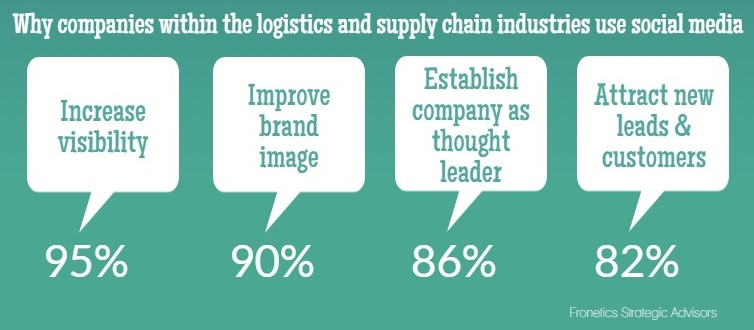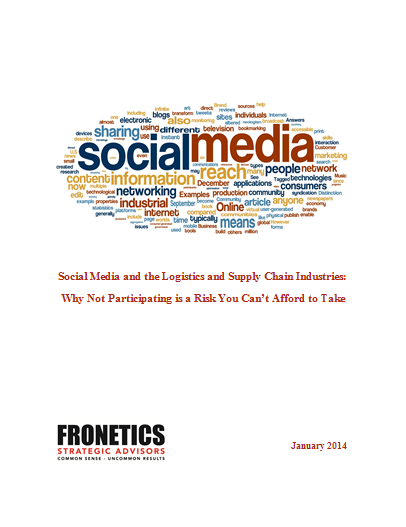
by Fronetics | Oct 30, 2014 | Blog, Marketing, Social Media, Strategy, Supply Chain

The use of third-party logistics providers are on the rise. As many as nine out of ten 3PLs surveyed by Inbound Logistics reported their client base grew by 5 percent this year, continuing the unabated expansion of recent years.
And there’s good reason for it.
In an interesting article on SupplyChain 24/7, Adam Robinson, the marketing guru at Cerasis, lists seven reasons companies should outsource non-core transportation management functions to 3PL providers. Surprisingly, perhaps, many of the same arguments can be applied to companies debating who should be in charge of their content creation.
As the number one reason to outsource, Robinson cites “Time and Money.”
He writes:
“3PL providers are able to reduce the amount of infrastructure investments in equipment, software, facilities and personnel… These 3PLs are like having non-paid employees on your staff and allow shippers to focus resources on areas where they are the expert (i.e. manufacturing, product sales).”
Time and money – or lack thereof – are similarly common issues among companies with respect to social media. In a new Fronetics report on social media use in the supply chain and logistics industries, nearly half of the respondents cited time and budgetary constraints as their top two challenges. Such companies may, as a result, participate only sporadically or not at all.
Since consistency is crucial to online lead generation, anything but a fulltime commitment to the company blog, content curation, and social media outreach is doomed to fail. An outside provider can, just like a 3PL, take these tasks off your hands, allowing you to focus on your core competencies.
Robinson also argues:
“As shippers rely on 3PL partners to provide more strategic oversight, and help catalyze business process change within the organization, the relationship is growing more fluid, and less analytical. Service providers are becoming an extension of the enterprise.”
In short, 3PL providers should not be perceived as outsiders but as partners who know their stuff. They contract with thousands of carriers and know the fastest and most reliable routes to move product from point A to point B.
A marketing company, especially one specialized in content creation for the logistics, transportation and supply chain industries, works the same way, drawing on a wealth of industry knowledge. In essence, you hire experts equipped with the right strategic tools to leverage their market expertise to your advantage.
Finally, Robinson writes visibility of loads gives 3PLs a leg up on the competition:
“Many 3PLs are able to integrate tracking into shipper IT systems, provide integration into ERP and WMS automated notices or even real-time delivery notifications by e-mail.”
Losing track of a shipment equals chaos. 3PL providers are there to ensure it never happens. In the same vein, companies need to track the metrics of their content strategy or risk wasting resources on something that yields no results. They need to know which social media outlets work for their business and what types of content draw traffic to their site. It takes time and resources – and as our survey revealed, both tend to be in short supply.
Your content marketing partner, on the other hand, knows metrics is as important as a shipment is to a 3PL provider.
Outsourcing content creation may be your strategic advantage over your competition.

by Fronetics | Oct 30, 2014 | Blog, Marketing, Social Media, Strategy, Supply Chain

The use of third-party logistics providers are on the rise. As many as nine out of ten 3PLs surveyed by Inbound Logistics reported their client base grew by 5 percent this year, continuing the unabated expansion of recent years.
And there’s good reason for it.
In an interesting article on SupplyChain 24/7, Adam Robinson, the marketing guru at Cerasis, lists seven reasons companies should outsource non-core transportation management functions to 3PL providers. Surprisingly, perhaps, many of the same arguments can be applied to companies debating who should be in charge of their content creation.
As the number one reason to outsource, Robinson cites “Time and Money.”
He writes:
“3PL providers are able to reduce the amount of infrastructure investments in equipment, software, facilities and personnel… These 3PLs are like having non-paid employees on your staff and allow shippers to focus resources on areas where they are the expert (i.e. manufacturing, product sales).”
Time and money – or lack thereof – are similarly common issues among companies with respect to social media. In a new Fronetics report on social media use in the supply chain and logistics industries, nearly half of the respondents cited time and budgetary constraints as their top two challenges. Such companies may, as a result, participate only sporadically or not at all.
Since consistency is crucial to online lead generation, anything but a fulltime commitment to the company blog, content curation, and social media outreach is doomed to fail. An outside provider can, just like a 3PL, take these tasks off your hands, allowing you to focus on your core competencies.
Robinson also argues:
“As shippers rely on 3PL partners to provide more strategic oversight, and help catalyze business process change within the organization, the relationship is growing more fluid, and less analytical. Service providers are becoming an extension of the enterprise.”
In short, 3PL providers should not be perceived as outsiders but as partners who know their stuff. They contract with thousands of carriers and know the fastest and most reliable routes to move product from point A to point B.
A marketing company, especially one specialized in content creation for the logistics, transportation and supply chain industries, works the same way, drawing on a wealth of industry knowledge. In essence, you hire experts equipped with the right strategic tools to leverage their market expertise to your advantage.
Finally, Robinson writes visibility of loads gives 3PLs a leg up on the competition:
“Many 3PLs are able to integrate tracking into shipper IT systems, provide integration into ERP and WMS automated notices or even real-time delivery notifications by e-mail.”
Losing track of a shipment equals chaos. 3PL providers are there to ensure it never happens. In the same vein, companies need to track the metrics of their content strategy or risk wasting resources on something that yields no results. They need to know which social media outlets work for their business and what types of content draw traffic to their site. It takes time and resources – and as our survey revealed, both tend to be in short supply.
Your content marketing partner, on the other hand, knows metrics is as important as a shipment is to a 3PL provider.
Outsourcing content creation may be your strategic advantage over your competition.

by Fronetics | Oct 14, 2014 | Blog, Logistics, Manufacturing & Distribution, Marketing, Social Media, Strategy, Supply Chain
Social media is a strategic tool. The benefits companies can realize by using social media are immense. Which benefits are motivating companies within the logistics and supply chain to use social media? Even more broadly, why are companies using social media?
A recent survey conducted by Fronetics Strategic Advisors found that the predominant reasons companies within the logistics and supply chain industries use social media are to: increase the visibility of their company; to improve their brand image; establish their company as a thought leader; and to attract new leads and customers.

To learn more about the use, motivations, benefits, and challenges of social media and the logistics and supply chain industries, download our report: Social media and the logistics and supply chain industries.


by Fronetics | Oct 14, 2014 | Blog, Logistics, Manufacturing & Distribution, Marketing, Social Media, Strategy, Supply Chain
Social media is a strategic tool. The benefits companies can realize by using social media are immense. Which benefits are motivating companies within the logistics and supply chain to use social media? Even more broadly, why are companies using social media?
A recent survey conducted by Fronetics Strategic Advisors found that the predominant reasons companies within the logistics and supply chain industries use social media are to: increase the visibility of their company; to improve their brand image; establish their company as a thought leader; and to attract new leads and customers.

To learn more about the use, motivations, benefits, and challenges of social media and the logistics and supply chain industries, download our report: Social media and the logistics and supply chain industries.


by Fronetics | Sep 9, 2014 | Blog, Marketing, Social Media, Strategy, Supply Chain

Many companies within the supply chain industry do not participate in social media because “they can’t get past the word ‘social’ and the perception it creates.” Companies with this mindset are at a disadvantage.
The supply chain industry is, by nature, an industry that is built on relationships, partnerships, cooperation, networks, and on communication. Being social is vital to the success of companies with the supply chain industry. Social media is a platform that is well poised to meet the needs and demands of the supply chain industry – and to help companies within the industry grow their business.
Social media is a tool that can be used be the supply chain industry for: risk management, business intelligence, recruitment, lead generation, engaging with current and prospective customers, attracting new customers, improving productivity, problem solving, and establishing your company as an industry leader. Moreover, social media can be used as the foundation for a new business model.
Clara Shih, CEO and Founder of Hearsay Social, and Lisa Shalett, Managing Director and Head of Brand Marketing and Digital Strategy at Goldman Sachs, write:
Social media is perhaps best thought of as a set of new and innovative ways for businesses and customers to do what they have always done: build relationships, exchange information, read and write reviews, and leverage trusted networks of friends and experts.
Similarly, Tony Martins, President of Tony Martins & Associates, notes that:
Supply chain executives should look at the social model of collaboration that can be enabled through social media as the most significant strategic weapon in supply chain optimization today. It liberates them from the rigid framework of functional structures and client-supplier relationships. It is the best way I’ve seen to keep the supply chain moving quickly, in spite of the many problems that will always occur.
Still skeptical? Look at companies who have successfully leveraged social media. Or, as Shih and Shalett suggest: “As you contemplate the risks and rewards of social media, we would suggest that the key ingredient for evaluation is simply to experience it for yourself.”
Interested in learning more about social media and the supply chain industry? Download our white paper: “Social Media and the Logistics and Supply Chain Industries: Why Not Participating is a Risk You Can’t Afford to Take.”





